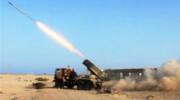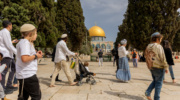A recently published poll finds the widely criticized group draws high levels of support from Palestinians in Gaza. With the two groups sharing support bases, why does one enjoy popular international support and the other the opposite?
A poll published yesterday tellingly revealed that almost a quarter of the Palestinian population hold positive views towards the Islamic State (IS), the same group who have been labelled ‘barbarians’ and ‘murderers’ by various world leaders after making headlines for their gruesome decapitations videos of western hostages.
On the face of it, the poll’s results seem surprising. Dig a little deeper and it appears that IS and Hamas, the elected government of the Gaza strip, have certain striking similarities. Both are designated terrorist groups – IS more widely considered so, following the recent spate of graphic, highly popularized recorded beheadings (the latest of which, displaying the gory death of American Peter Kassig, 26, amongst Syrian army captives, was released yesterday); Hamas is designated as a terrorist group by the US, the UK and Israel, amongst others.
Last week, IS and Hamas respectively were ranked in first and second places as Forbes’ ‘richest terror groups‘. While this is terrifying in itself, and it is clear that IS are spending their loose change on professional-standard video production, Hamas’ use of cash is less obvious. At least it was until this past summer, where it was revealed that Hamas had been spending millions of dollars of foreign aid on rockets, weaponry and concrete tunnels in order to attack Israel, rather than on supporting their own population.
Calling a spade a spade
But this is where the similarities die out. IS, for all of their international condemnation, draw high numbers of fighters from western countries. They seek to recruit second or third generation immigrant Muslims – both boys, to fight, and girls, some as young as 15, to marry soldiers and propagate a sharia state – who feel alienated from both their parents culture and the culture of their western host country. It’s not difficult to rationalize why IS attracts these sorts – its seeming success, causing the watching world to recoil passively in horror time and time again, provides the lost and confused souls who sign up to it a sense of power and achievement.
For Hamas, this is inverted. While the group is denounced (to some extent) internationally, save for the Arab world (and the international terror enablers who bankroll the group), Hamas receives great popular support around the world, as seen during the summer war.
Most Israelis spent the summer running back and forth to bomb shelters (items which Hamas failed to provide for their own citizens, preferring to use the money to fund terror instead). However, rather than this being the subject of international fury, as surely it would be had the situation occurred elsewhere in the world, rallies against Israel around the world seemed to ignore the fact that Hamas’ war was intentionally seeking to destroy Israel, specifically targeting civilians, but also its own people via the use of human shields.
Conversely, Israel’s retaliatory actions and delayed ground offensive were attempts to defend itself and keep its citizens safe. It is a bewildering double standard that one terrorist group should be publicly decried, while the other publicly and loudly defended for committing similar acts towards its own people, not to mention simultaneously attacking a bordering population.
An Islamic State in Gaza
While debates rage over IS’ next move, and whether it would reach Israel, there are concerns that IS has already gained popular support, and even harbors operatives within the Gaza strip. If this is so, then the poll’s results are even more unsurprising and unsettling. Furthermore, the poll should be a wake-up call to the international community to not only the dangerous latent Arab support for IS, but also of the true self-declared danger of Hamas.






















